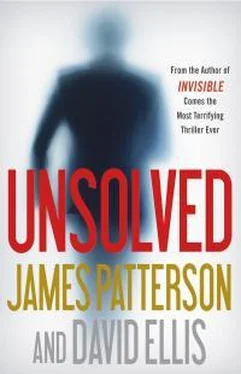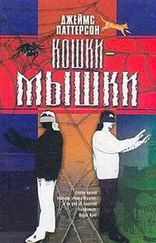He doesn’t remember his exact words. But he remembers every word Emmy said in response.
He’s scaring the people in power, she said. Maybe that’s the only way to get them to change. Nothing else has worked.
That was it. It was one of those lazy mornings where conversations started and stopped and shifted. He never followed up. It didn’t stick out in his mind at the time. After all, Emmy had always been a protester at heart, ever since she was in high school, the sober, socially conscious girl, nothing like her popular-cheerleader-girl twin sister.
It gnaws at him now. Emmy might not approve of all of Citizen David’s tactics, but deep down, all things considered, she might be quietly rooting for him.
And that isn’t even the worst part.
“We don’t know how yet,” says Dwight Ross, leaning back in his chair, “but she’s leaking to that reporter.”
That was the worst part. Books had forgotten, but now it slams against his chest like a stiff forearm. The reporter who wrote the Post piece was Shaindy Eckstein.
Does the Bureau know that Shaindy and Emmy are close? That Shaindy is quite possibly Emmy’s only friend these days?
Shaindy, the one who learned about Emmy being rushed to the hospital after taking a combination of painkillers and amphetamines a year ago but who didn’t break the story after Books asked her not to, after Books looked her in the eye and said that it would be so painful for her to have it publicized. Some gossip rag got wind of it, probably from some paramedic or nurse on its payroll, and it all came out anyway, but Books never forgot what Shaindy did. Neither did Emmy. A friendship formed. Trust formed.
And now Shaindy Eckstein is writing stories on the FBI’s hunt for Citizen David, stories rich with details.
“No way,” Books says, trying to keep his voice strong, no longer sure what he believes.
17
THE MEETING is adjourned. Books gets to his feet on unsteady legs, a dull, sick feeling in his stomach. His brain tells him that Emmy looks guilty. His heart doesn’t want that to be true. His instinct, his gut, believes it can’t be true.
Dwight Ross leaves the room. Director Moriarty puts a hand on Bookman’s shoulder. “Like I said before, I’m sorry as hell about this. And I’m even sorrier to involve you in the investigation. But it has to be done.”
“Emmy’s not the leaker.” But even as Books says the words, he feels a distance forming; the picture of the woman he loves is fading and blurring. After all, she’s back to her obsessive hunt for a serial killer, and she didn’t tell him a thing about that . What else hasn’t she told him?
“Maybe not, maybe not,” says the director, though it comes out sounding like a lame attempt to placate him.
Books clears his throat and gives the director a curt nod. “Hey, Bill, I need to make a call. A landline. The cell reception in this place…”
“Not a problem.” The director gestures to a phone in the corner of the room.
Books wanders toward the phone, lost in thought, taking his time, waiting for the director to leave him alone in this room. He removes his wallet from his pants pocket and fishes out the business card, by now ragged at the edges and smudged with an unidentifiable substance.
His hands are shaking. He misdials the first time. He’s grown unaccustomed to landline phones; he has one at the bookstore but almost never uses it to call anyone.
A woman answers. “Dr. Bakalis’s office.”
Books takes a deep breath before speaking to Emmy’s therapist’s receptionist.
18
I GO straight from the airport to the Hoover Building. In the lobby, I figure that if the elevators are efficient and not too crowded, I might get to this meeting on time. I’d prefer to park my roller suitcase at my cubicle but there’s no time for that, so when I get upstairs, I leave it with Dwight Ross’s receptionist, a saintly woman named Roberta.
I pull the relevant files out of my folder, take a moment to compose myself, and stride down the hall to the conference room. I’m the last to arrive, as usual. The rest of the team members are present and alert: Carlton from the National Security Branch, Sloan from the Criminal Investigative Division, Mayfield from Intelligence, Cobbs from the Science and Technology Branch. All dark suits, crisp white shirts, boring ties. The men of the FBI; their motto could be “What We Lack in Imaginative Wardrobe, We Make Up for with Colorless Personalities.”
And Dwight Ross himself, the executive assistant director of the Criminal, Cyber, Response, and Services Branch, at the head of the table, running the operation.
“Dockery, you’re late,” he says, glancing at me and then at the clock.
“Sorry, sir.” One and a half minutes late. Ninety seconds.
“This will be the last time you are late,” he says.
“Yes, sir,” I say, because men like Ross like that kind of submissive response from women, even though we both know it’s probably not the last time I’ll be late.
I’m not really sure why I’m here at all. These days I do most of my work at home, my secure undisclosed location, thanks to all the threats I’ve received. With multiple computers, secure access to the Bureau databases, a cell phone, and a video feed, I can do pretty much anything from my home office.
It wasn’t my choice to work from home—at least, not at first. The doctors wouldn’t clear me to return to the office for nearly a year, so working from home had been my idea, a way to “take it easy” and “rest and recuperate” but still contribute. Then I realized how effective I could be if I didn’t have to leave my apartment. I could eliminate the commute, the small-talk conversations throughout the day, the unnecessary staff meetings, the cake-in-the-conference-room birthday parties.
And yes, I admit it—I have to acknowledge it—staying home lessens the fear. I tell myself it’s in the past, but every now and again, it creeps up behind me and wraps its arm around my throat. When I’m in the car, on the elevator, at the grocery store. And it doesn’t slowly build up—it steals my breath and squeezes my neck and pummels my chest all at once.
So, yeah, if I’m going to have a panic attack, if I’m going to collapse to the floor and curl up in a fetal position and have to breathe into a paper bag, I’d rather not do it in front of my coworkers.
Ross eyes me with that expressionless, cold stare. I think he wanted more than a “Yes, sir” from me. He wanted more groveling, more remorse, for being ninety seconds late to the meeting.
Before his recent promotion to executive assistant director, Dwight Ross was in Intelligence, where, as far as anyone could tell, he had his head so far up the director’s ass that when the director belched, you could smell Dwight’s cologne. He likes the people who work under him to follow that model, which is one of the reasons we don’t get along so well.
We are here about Citizen David, the domestic terrorist who has given the Bureau fits and become a darling of social media in the process.
Carlton, who has a buzz cut and thick glasses, begins. Nothing new from the National Security Branch. No evidence that David is connected to any active terrorist cell, no chatter or indications of coordination.
Sloan, from the Criminal Investigative Division, doesn’t help much either—David isn’t leaving any traces behind when he blows up buildings. David seems to know how to avoid the CCTV cameras. He uses local materials for his rudimentary bombs. And it seems that Citizen David is working alone.
Nothing from Science and Technology either, says Cobbs, because David uses an anonymous server to post his messages on Facebook. The Bureau has tried to trace his messages and thus far has pegged him in Ukraine, in Mexico City, in New Zealand, and in Uruguay.
Читать дальше












